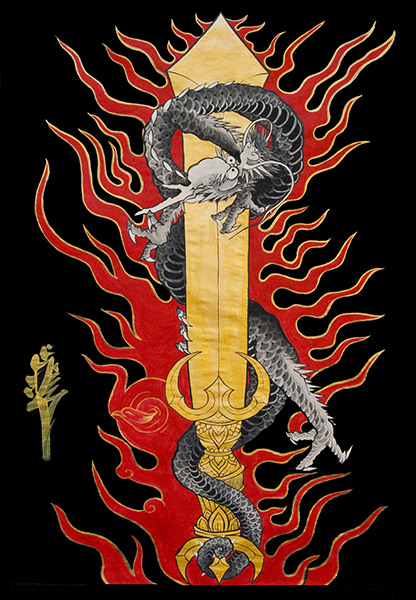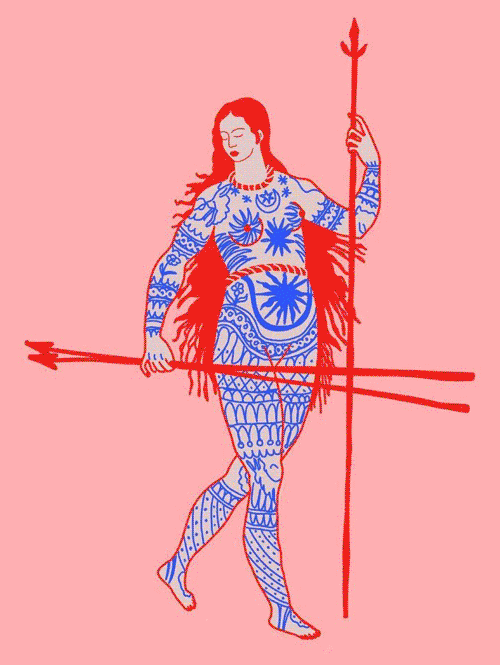Create an account
Welcome! Register for an account
La password verrà inviata via email.
Recupero della password
Recupera la tua password
La password verrà inviata via email.
-
- container colonna1
- Categorie
- #iorestoacasa
- Agenda
- Archeologia
- Architettura
- Arte antica
- Arte contemporanea
- Arte moderna
- Arti performative
- Attualità
- Bandi e concorsi
- Beni culturali
- Cinema
- Contest
- Danza
- Design
- Diritto
- Eventi
- Fiere e manifestazioni
- Film e serie tv
- Formazione
- Fotografia
- Libri ed editoria
- Mercato
- MIC Ministero della Cultura
- Moda
- Musei
- Musica
- Opening
- Personaggi
- Politica e opinioni
- Street Art
- Teatro
- Viaggi
- Categorie
- container colonna2
- container colonna1
Crez – Dragons
L’artista italiano Crez, considerato uno dei migliori tatuatori dello stile giapponese, analizza l’immagine simbolo dell’iconografia dell’horimono: il drago. Esperto di un’antica tradizione, la elabora con la contemporaneità di chi crede nella comprensione e assimilazione delle altre culture.
Comunicato stampa
Segnala l'evento
Il 26 gennaio 2017 inaugura alla Parione9 Gallery DRAGONS, prima mostra personale del tatuatore veneto Massimiliano Freguja aka Crez per poi essere riallestita dal 4 maggio al 25 giugno 2017 alla Senaspace Art Gallery di New York.
Crez ha cominciato a tatuarsi da bambino affascinato dai racconti del padre marinaio e naufrago che portava su di sé i ricordi dipinti dei suoi mille viaggi. Oggi è considerato uno tra i migliori tatuatori dello horimono, lo stile classico giapponese che studia da decenni. Quando Crez non è nel suo studio Adrenalink di Marghera, di sicuro è al lavoro con i colleghi del Sol Levante tra Morioka, Fukuoka, Niigata, Tokyo, Yokohama e Kobe.
Il tatuaggio in Giappone è un’arte non ufficialmente riconosciuta e non ebbe mai da parte del governo un vero consenso ufficiale. Nelle varie iniziative legislative contro la pratica del tatuare si arrivò addirittura nell’Ottocento a censurare ukiyoe e qualunque forma d’arte in cui apparissero corpi decorati con horimono. Lo horimono ha radici profonde nel folklore e nella cultura nipponica ed è il primo esempio storico di tatuaggio pittorico policromo, nato per adornare tutto il corpo. Dal Novecento è soprattutto grazie agli stranieri, tatuatori e tatuati, che questo stile trova ampia diffusione.
Proprio in questi giorni in Giappone un giovanissimo tatuatore di Osaka, Taiki Masuda, ha pubblicamente sfidato il governo che vuole chiudere i tattoo studio e rendere i tatuaggi fuorilegge rifacendosi ad una legge dell'Ottocento che vieta di intervenire sul corpo a chi non sia medico. La guerra ai tatuaggi ha radici antiche: per secoli in Giappone, e altrove, i marchi sulla pelle sono stati visti come segno distintivo della criminalità o di categorie sociali non proprio distintissime. Negli ultimi anni la “moda” del tatuaggio ha riabilitato questi antichissimi affreschi sul corpo umano. Li vediamo ovunque, ma raramente nella loro terra d’origine salvo occasioni come il Sanja matsuri. Taiki con la sua campagna “Save Tattooing” afferma come il tatuare e tatuarsi siano ‘un’ arte e un diritto’ e non un crimine.
La mostra di Crez analizza un’immagine in particolare del vasto mondo iconografico dello horimono, quella del drago. I dragoni di Crez, esposti su tredici tavole di vari formati realizzate in tecnica mista su carta scenica, sono il frutto di un dialogo tra la cultura orientale e quella occidentale. Le due culture convivono sulla stessa superficie, l’artista rispetta l’iconografia e la tecnica della prima plasmandole e intervenendo sull’immagine secondo il proprio linguaggio estetico e stilistico.
In Oriente il drago, simbolo di saggezza e coraggio, è un creatura fantastica composta da diversi animali che racchiude in sè i quattro elementi (terra, fuoco, acqua, aria). In Occidente, nella mitologia classica e nelle religioni più antiche, esso rappresentava la sapienza, la fertilità e la scienza medica per diventare solo con il Cristianesimo l’incarnazione di Satana.
Crez, esperto e rispettoso di una antica tradizione, la elabora con la contemporaneità di chi crede nella comprensione e assimilazione delle altre culture e nel creare ponti e non divisioni.
WORKSHOP_ Il viaggio del drago attraverso l’Asia
a cura di Crez
domenica 29 gennaio 2017 - dalle ore 10 alle ore 17
costo del workshop: 150 €
posti limitati: 10 persone con prenotazione obbligatoria
per info: parione9@gmail.com o 06/45615644
In occasione della mostra "Dragons" che si terrà a Roma galleria Parione9 ed a New York, Senaspace Art gallery, presenteró una conferenza intitolata: "il viaggio del Drago attraverso l’Asia" nella quale tratteró la storia di questo misterioso animale mitologico con un occhio di riguardo alla relazione tra questo soggetto e la cultura dell' Horimono, il tatuaggio tradizionale Giapponese.
Al termine della conferenza, inizierà la parte tecnica "workshop" dedicato a chi vuole migliorare le proprie capacità nel disegno di questo complesso soggetto e le sue applicazioni nel campo del tatuaggio.
Il workshop consisterà nella realizzazione di un dragone dall'inizio alla fine del processo creativo:
- Progettazione e schizzo su carta con matita .
- Realizzazione di un definitivo a pennello su carta.
I materiali vi verranno forniti dalla galleria, disegneremo assieme ogni parte del soggetto, fino alla composizione finale.
---------------------------------------------
Parione9 Gallery opens on January 26, 2017 DRAGONS, the first solo show by Venetian tattoo artist veneto Massimiliano Freguja aka Crez. The exhibition will then travel to New York where it will be on view at SenaspaceArt Gallery from May 4 to June 25.
Crez did his first tattoo on himself when he was 9 years old, fascinated by the stories of his father, sailor and only survivor of a shipwreck, and the painted souvenirs on his body of his many journeys. Crez today is considered one of the best tattoo artists of horimono, the Japanese traditional style that he has studied for decades now. When Crez is not in his tattoo parlor Adrenalink in Marghera, for sure one can find him working with his Japanese colleagues in Morioka, Fukuoka, Niigata, Tokyo, Yokohama and Kobe.
In Japans tattooing is not an officially recognized form of art and rather considered a stigma and banned for many years. In the XIX century even the ukiyoe or any other artwork portraying painted bodies appeared were censored.
Horimono practice is rooted in the culture and folklore of Japanese history and it is the first example of pictorial polychrome tattoo created to decorate the entire body. In the XX century the style leaves the boundaries of Japan as foreigners, tattooed people and tattooists, export it worldwide.
Very recently in Japan a young tattoo artist from Osaka, Taiki Masuda, has publicly challenged the Government and is taking his fight to court as the police has started to close tattoo studios because of the narrow interpretation of the Medical Practitioners Law which allows only medical doctors to touch a body and essentially turning tattoo artists into criminals Japan has a long history with fighting tattoo practice: for centuries in Japan, and not only, ink marks on bodies were associated with criminals or very low working class members. In recent years, fashion and trends have redeemed these ancient body frescoes. We see them everywhere but rarely in the land where they were conceived and only in special occasion like the Sanja matsuri. Taiki with his campaign “Save Tattooing” voices the fact that being a tattoo artist of being tattooed is an art and a right of freedom, not a crime.
Crez’s exhibition focuses on one particular image of the vast iconographic world of horimono, the Dragon. Crez’s dragons are exhibited in 13 works of various formats realized with mixed techniques on paper and they are clearly the result of a dialogue between the East and the West. They become both alive on the same surface as the artist while respecting the iconography and the technique of the first, elaborates the image according to his own esthetics and style.
In the East the dragon is a symbol of wisdom and courage. It is a creature of fantasy made of several animals and it houses the four elements (earth, fire, water, air). In the West, in classic mythology and in the oldest religions, it represented knowledge, fertility and medical science. Only with Christianity it became the incarnation of Satan.
Crez is an expert of an old tradition and he respects it. He elaborated it with the contemporary spirit of an artist who believes in the understanding and of other cultures and in creating bridges and not divisions.
WORKSHOP_ The journey of the dragon through Asia
by Crez
Sunday January 29th - from 10 am to 5 pm
price: 150 €
places limited to 10 with reservations required
On Sunday January 29, Crez leads the lecture - workshop “The journey of the Dragon through Asia” in which he explains the history of this mysterious creature analyzing the relation of this subject with the culture of Horimono and the traditional Japanese tattoo. At the end of lecture, the practical workshop begins for those who want to perfect the drawing techniques and its applications in tattooing art. The workshop will consist in experiencing the creative process of realizing the dragon and in particular:
- concept and pencil sketch on paper
- final drawing with brushes on paper
All material will be provided by the gallery and Crez will draw together with the participants until the final result.
Parione9 | via di Parione 9 (piazza Navona) Roma
Orari: martedì - sabato 10.30-13.30 / 15.30 - 19.30
domenica 15.30 – 19.30
info: tel 0645615644 | parione9@gmail.com | www.parione9.com
Crez ha cominciato a tatuarsi da bambino affascinato dai racconti del padre marinaio e naufrago che portava su di sé i ricordi dipinti dei suoi mille viaggi. Oggi è considerato uno tra i migliori tatuatori dello horimono, lo stile classico giapponese che studia da decenni. Quando Crez non è nel suo studio Adrenalink di Marghera, di sicuro è al lavoro con i colleghi del Sol Levante tra Morioka, Fukuoka, Niigata, Tokyo, Yokohama e Kobe.
Il tatuaggio in Giappone è un’arte non ufficialmente riconosciuta e non ebbe mai da parte del governo un vero consenso ufficiale. Nelle varie iniziative legislative contro la pratica del tatuare si arrivò addirittura nell’Ottocento a censurare ukiyoe e qualunque forma d’arte in cui apparissero corpi decorati con horimono. Lo horimono ha radici profonde nel folklore e nella cultura nipponica ed è il primo esempio storico di tatuaggio pittorico policromo, nato per adornare tutto il corpo. Dal Novecento è soprattutto grazie agli stranieri, tatuatori e tatuati, che questo stile trova ampia diffusione.
Proprio in questi giorni in Giappone un giovanissimo tatuatore di Osaka, Taiki Masuda, ha pubblicamente sfidato il governo che vuole chiudere i tattoo studio e rendere i tatuaggi fuorilegge rifacendosi ad una legge dell'Ottocento che vieta di intervenire sul corpo a chi non sia medico. La guerra ai tatuaggi ha radici antiche: per secoli in Giappone, e altrove, i marchi sulla pelle sono stati visti come segno distintivo della criminalità o di categorie sociali non proprio distintissime. Negli ultimi anni la “moda” del tatuaggio ha riabilitato questi antichissimi affreschi sul corpo umano. Li vediamo ovunque, ma raramente nella loro terra d’origine salvo occasioni come il Sanja matsuri. Taiki con la sua campagna “Save Tattooing” afferma come il tatuare e tatuarsi siano ‘un’ arte e un diritto’ e non un crimine.
La mostra di Crez analizza un’immagine in particolare del vasto mondo iconografico dello horimono, quella del drago. I dragoni di Crez, esposti su tredici tavole di vari formati realizzate in tecnica mista su carta scenica, sono il frutto di un dialogo tra la cultura orientale e quella occidentale. Le due culture convivono sulla stessa superficie, l’artista rispetta l’iconografia e la tecnica della prima plasmandole e intervenendo sull’immagine secondo il proprio linguaggio estetico e stilistico.
In Oriente il drago, simbolo di saggezza e coraggio, è un creatura fantastica composta da diversi animali che racchiude in sè i quattro elementi (terra, fuoco, acqua, aria). In Occidente, nella mitologia classica e nelle religioni più antiche, esso rappresentava la sapienza, la fertilità e la scienza medica per diventare solo con il Cristianesimo l’incarnazione di Satana.
Crez, esperto e rispettoso di una antica tradizione, la elabora con la contemporaneità di chi crede nella comprensione e assimilazione delle altre culture e nel creare ponti e non divisioni.
WORKSHOP_ Il viaggio del drago attraverso l’Asia
a cura di Crez
domenica 29 gennaio 2017 - dalle ore 10 alle ore 17
costo del workshop: 150 €
posti limitati: 10 persone con prenotazione obbligatoria
per info: parione9@gmail.com o 06/45615644
In occasione della mostra "Dragons" che si terrà a Roma galleria Parione9 ed a New York, Senaspace Art gallery, presenteró una conferenza intitolata: "il viaggio del Drago attraverso l’Asia" nella quale tratteró la storia di questo misterioso animale mitologico con un occhio di riguardo alla relazione tra questo soggetto e la cultura dell' Horimono, il tatuaggio tradizionale Giapponese.
Al termine della conferenza, inizierà la parte tecnica "workshop" dedicato a chi vuole migliorare le proprie capacità nel disegno di questo complesso soggetto e le sue applicazioni nel campo del tatuaggio.
Il workshop consisterà nella realizzazione di un dragone dall'inizio alla fine del processo creativo:
- Progettazione e schizzo su carta con matita .
- Realizzazione di un definitivo a pennello su carta.
I materiali vi verranno forniti dalla galleria, disegneremo assieme ogni parte del soggetto, fino alla composizione finale.
---------------------------------------------
Parione9 Gallery opens on January 26, 2017 DRAGONS, the first solo show by Venetian tattoo artist veneto Massimiliano Freguja aka Crez. The exhibition will then travel to New York where it will be on view at SenaspaceArt Gallery from May 4 to June 25.
Crez did his first tattoo on himself when he was 9 years old, fascinated by the stories of his father, sailor and only survivor of a shipwreck, and the painted souvenirs on his body of his many journeys. Crez today is considered one of the best tattoo artists of horimono, the Japanese traditional style that he has studied for decades now. When Crez is not in his tattoo parlor Adrenalink in Marghera, for sure one can find him working with his Japanese colleagues in Morioka, Fukuoka, Niigata, Tokyo, Yokohama and Kobe.
In Japans tattooing is not an officially recognized form of art and rather considered a stigma and banned for many years. In the XIX century even the ukiyoe or any other artwork portraying painted bodies appeared were censored.
Horimono practice is rooted in the culture and folklore of Japanese history and it is the first example of pictorial polychrome tattoo created to decorate the entire body. In the XX century the style leaves the boundaries of Japan as foreigners, tattooed people and tattooists, export it worldwide.
Very recently in Japan a young tattoo artist from Osaka, Taiki Masuda, has publicly challenged the Government and is taking his fight to court as the police has started to close tattoo studios because of the narrow interpretation of the Medical Practitioners Law which allows only medical doctors to touch a body and essentially turning tattoo artists into criminals Japan has a long history with fighting tattoo practice: for centuries in Japan, and not only, ink marks on bodies were associated with criminals or very low working class members. In recent years, fashion and trends have redeemed these ancient body frescoes. We see them everywhere but rarely in the land where they were conceived and only in special occasion like the Sanja matsuri. Taiki with his campaign “Save Tattooing” voices the fact that being a tattoo artist of being tattooed is an art and a right of freedom, not a crime.
Crez’s exhibition focuses on one particular image of the vast iconographic world of horimono, the Dragon. Crez’s dragons are exhibited in 13 works of various formats realized with mixed techniques on paper and they are clearly the result of a dialogue between the East and the West. They become both alive on the same surface as the artist while respecting the iconography and the technique of the first, elaborates the image according to his own esthetics and style.
In the East the dragon is a symbol of wisdom and courage. It is a creature of fantasy made of several animals and it houses the four elements (earth, fire, water, air). In the West, in classic mythology and in the oldest religions, it represented knowledge, fertility and medical science. Only with Christianity it became the incarnation of Satan.
Crez is an expert of an old tradition and he respects it. He elaborated it with the contemporary spirit of an artist who believes in the understanding and of other cultures and in creating bridges and not divisions.
WORKSHOP_ The journey of the dragon through Asia
by Crez
Sunday January 29th - from 10 am to 5 pm
price: 150 €
places limited to 10 with reservations required
On Sunday January 29, Crez leads the lecture - workshop “The journey of the Dragon through Asia” in which he explains the history of this mysterious creature analyzing the relation of this subject with the culture of Horimono and the traditional Japanese tattoo. At the end of lecture, the practical workshop begins for those who want to perfect the drawing techniques and its applications in tattooing art. The workshop will consist in experiencing the creative process of realizing the dragon and in particular:
- concept and pencil sketch on paper
- final drawing with brushes on paper
All material will be provided by the gallery and Crez will draw together with the participants until the final result.
Parione9 | via di Parione 9 (piazza Navona) Roma
Orari: martedì - sabato 10.30-13.30 / 15.30 - 19.30
domenica 15.30 – 19.30
info: tel 0645615644 | parione9@gmail.com | www.parione9.com
26
gennaio 2017
Crez – Dragons
Dal 26 gennaio al 19 febbraio 2017
arte contemporanea
Location
PARIONE9 – STUDIO BANDAZZI
Roma, Via Di Parione, 9, (Roma)
Roma, Via Di Parione, 9, (Roma)
Orario di apertura
da martedì a sabato ore 10.30-13.30 e 15.30-19.30
domenica ore 15.30-19.30
Vernissage
26 Gennaio 2017, ore 18.30
Autore
Curatore









